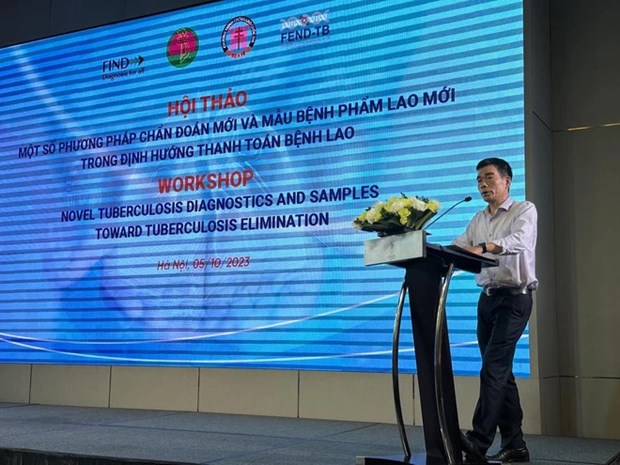 A doctor at the Central Lung Hospital examines a patient. (Photo: VietnamPlus)
A doctor at the Central Lung Hospital examines a patient. (Photo: VietnamPlus)Hanoi (VNA) – Developing new tools for novel (TB) diagnostics and samples can enhance a patient’s ability to access TB screening, allowing the health system to optimise efforts in the prevention of the disease.
Associate Professor Nguyen Binh Hoa, Deputy Director of the and Deputy Head of the Executive Board of the National Tuberculosis Programme made the remarks at a workshop on novel tuberculosis diagnostics and samples held in Hanoi on October 5.
New techniques needed
TB, an infectious disease usually caused by Mycobacterium tuberculosis bacteria, still significantly impacts global public health, Hoa said. According to the 2022 World Health Organisation Report, there were around 10.6 million TB cases globally in 2021, with 6.7% of TB patients infected with HIV.
Notably, accessing TB diagnosis remains a barrier to tuberculosis care and treatment. In recent years, diagnostic tests for TB have been developed and many new techniques have been applied, thus enhancing support for rapid and accurate diagnosis. These include GeneXpert, LPA, TB LAMP, TrueNat, and the genome sequence of Mycobacterium tuberculosis.
According to Associate Professor Hoa, due to the complex nature of TB and difficulties in accessing diagnostic tests, the need for simpler, highly accurate new techniques that can be easily implemented in basic healthcare facilities is becoming increasingly essential. This is especially so for high-risk groups like HIV-infected patients.
Rapid diagnosis and early detection of TB also help reduce the need for contact tracing and the risk of disease transmission, thus improving TB prevention and treatment outcomes.
 Associate Professor Nguyen Binh Hoa, Deputy Director of the Central Lung Hospital, speaks at workshop. (Photo: VietnamPlus)
Associate Professor Nguyen Binh Hoa, Deputy Director of the Central Lung Hospital, speaks at workshop. (Photo: VietnamPlus)Dr. Nguyen Thi Van Anh, head of the FIND Office in Vietnam, a global non-profit that promotes activities on research and control of communicable diseases, said that current tuberculosis diagnostic methods have limitations regarding time, sensitivity, cost, and sample types. Most methods still have shortcomings when applied to extrapulmonary TB cases or HIV-infected persons. Therefore, developing effective diagnostic tests, especially those using clinical specimens other than sputum, is essential for extrapulmonary tuberculosis patients, those unable to produce sputum, and HIV-infected , she said.
FIND recognises the necessity of researching and applying new TB diagnostic methods using different disease specimens outside of sputum, Anh noted. She said this approach opens up a more diverse range of technical solutions for the development of new tests.
Accelerating evaluation for early adoption
Associate Professor Nguyen Van Hung from the Central Lung Hospital said that the National Tuberculosis Programme is collaborating with FIND to implement a project on evaluating the accuracy of novel diagnostics for detecting TB in adults – FEND-TB – from June 2021 to June 2025.
The project aims to evaluate novel TB diagnostics in adults at an early stage in TB high-burden countries, providing new and more suitable diagnostic tools.
The estimated number of selected patients is 1,211, including 287 suspected TB cases and HIV infections, he said. The research samples will undergo standard diagnostic tests following the current programme’s procedures to serve as a reference for evaluating novel .
FIND has conducted multiple rounds of evaluation registrations from research and development units worldwide to select potential novel TB and drug-resistant TB diagnostics for continuous project evaluations, Hung added./.
Source: VietnamPlus
